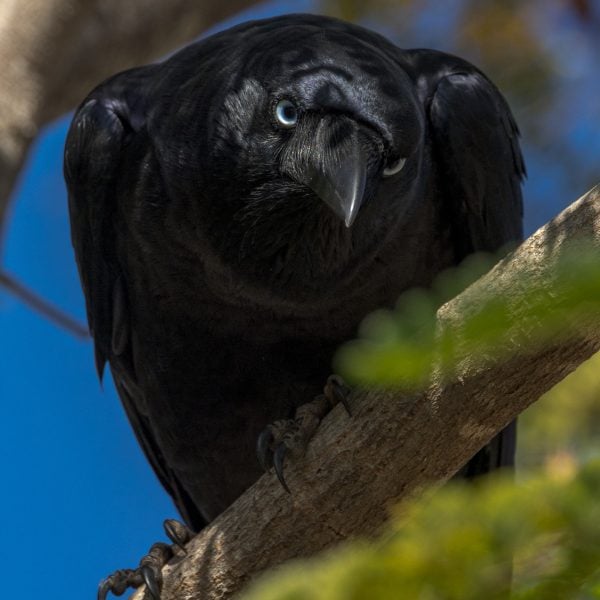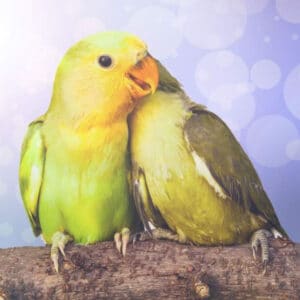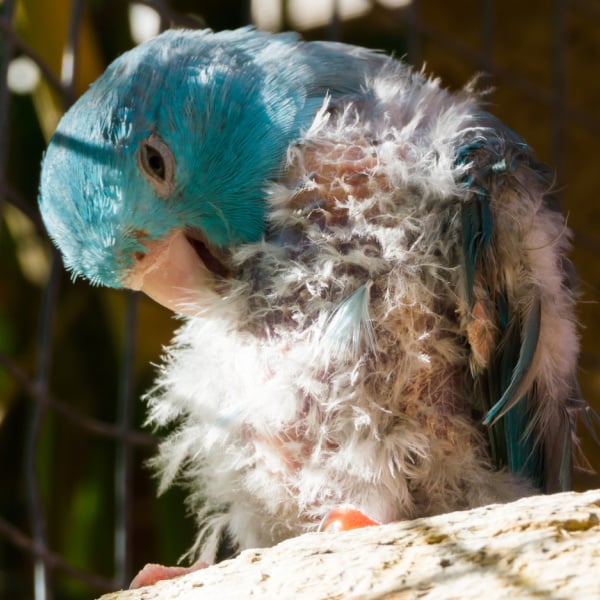
How Can I Stop My Parrot From Plucking Its Feathers?
Last Updated on by Mitch Rezman
From a Facebook fan last night
I’ve got a Catalina macaw that has a problem of plucking, I took her to the vet, she has a clean bill of health, now if anyone can help with the feather plucking problem, I would appreciate it, Thanks
From a customer on the West Coast during a phone call this week
“My 14-year-old lovebird began to pluck for no reason at all.
We have him on the best foods we can provide like Harrison’s pellets but we had to put a collar on her to stop the feather loss.
Nothing has changed in her life and she is fully flighted”
From a Facebook fan in South Africa earlier this week
Hello, I need help, please. I get an African Grey Parrot as a gift, but he/she plucks his feathers.
I give him stuff to put in his water for stress and still plucks its feathers. What can I do, please I need help.
Rule number one – Plucking is a slippery slope.
Regardless of the trigger, it can be very difficult to stop. This just defines frustration.
It’s heartbreaking but in most cases, it can be solved.
It’s difficult for me to offer a course of action that reduces or eliminates feather plucking based upon a paragraph or two of input about the bird so for now, I’d like to focus on possible triggers.
Nutrition
“What you feed your bird will have a huge impact on their overall well-being”, he states the obvious.
The subject is too broad to get into detail here but one of the things we are learning is that citrus fruit may be a plucking trigger.
For a refresher course on your bird’s digestive system and an expanded explanation of the relationship between citrus and plucking, read 10 plucking triggers your vet never talks about.
No time to stray? Here’s the skinny.
When a bird eats, the food flows into their crop (which is up by their chest) and stays there for up to six hours before.
Birds don’t have an acid-based homeostasis buffering system like humans, so with a few large chunks of a Florida orange sitting in their crop, isn’t it possible your bird may develop what we humans call heartburn – in their chest area?
This is how well-nourished birds may begin to pluck at their chest feathers.
Few or no foraging opportunities
In the wild, your bird can spend 3 to 5 hours a day searching for food.
At home is always something waiting in the dish that is easily accessible.
What else are these birds doing with the intelligence of a two-year-old child while you’re at work and they are alone all day long?
These are animals that have rational thoughts, can reason, including being able to pre-plan events into the future.
Alex the African grey parrot was a thirty-year experiment by animal psychologist Irene Pepperberg, initially at the University of Arizona and later at Harvard University and Brandeis University.
Alex would ask existential questions like “what color am I”?
Boredom is the number one trigger of plucking.
To this, you say “hey I love my bird and I give my bird all the toys she wants.
I put a new toy in the cage every week.
When you introduce a new toy we advocate that you rearrange all of the toys in the cage so the bird is pleasantly distracted and now has additional areas to explore.
Sometimes adding a single new bird toy can be quite scary, especially later in the day when long shadows are cast.
Foot health
[videopress dl59i6Us]
Is your bird sleeping on an abrasive perch?
Over a period of 30 years, a bird will spend more than 100,000 hours on their sleeping perch.
A soft rope perch relieves foot stress and gives the bird something to pluck it other than feathers.
More information can be found at Does the plethora of parrot perches produce puzzlement? Learn perches & placement now!
It’s important to have at the very least three different textures of perches so your bird’s feet are always being challenged.
They are on their feet 24/7
[videopress jwSYKrxW]
Windows
A birdcage should always be placed against at least one wall preferably two, to help provide a feeling of security.
Placing a birdcage in front of a large picture window can provide your bird with both entertainment and be a pleasant distraction.
Before doing so we suggest that you spend some time looking out of that window to ensure that raptors aren’t soaring or migrating in the area.
Your bird has great eyesight and does not understand the concept of glass.
The site of a distant bird of prey can be quite stressful.
Lice and mites.
A few days later I noticed a balding spot around her left ear and a little redness (seen in the featured image above).
She really hasn’t had excessive scratching and I’m uncertain if this is mite related or a skin issue?
I sent you one photo of the right ear to compare to two photos of the left ear.
My dogs have been scratching excessively and we are battling a few fleas, despite having all tile floors.
Lack of privacy
Parrots are prey animals and their existence in the wild is based on the 60/40 rule.
60% of the time they are searching for food and 40% of the time they’re trying not to be food.
When your bird is in its cage it wants to feel as comfortable as you do when you close the window blinds and pulled the covers over your shoulders to fall asleep.
You want your bird to feel comfortable and secure in its cage.
You should have so many toys the top third of your cage you can see the bird.
This will provide areas your bird can hide behind thereby giving them a sense of security.
Read more on Arranging your bird’s cage: The Cage Canopy Concept
Another privacy issue does your plucking bird feel threatened by other birds or animals in the house?
Birds are flock animals instinctively anticipating certain group behaviors.
If your cat, two dogs, and your ferret don’t interact like a flock of Sulfur Crested Cockatoos milling about in a grassy area, your bird may be stressed out by the dynamics of all of those relationships, which may need to be examined.
As an example, your bird might feel fine in the upper portion of its cage with your cat on the floor but if your cat jumps above the bird’s cage he or the bird might be instinctively anticipating a potential attack.
Flight
“Flighted birds are healthier birds”.
There are lots of well-adjusted birds with clipped wings but from the bird’s point of view, it’s quite an unnatural feeling.
They can feel off-balance while walking lacking the ability to have 100% of their balance using the wings.
The rough edges on the remainder of the largest wings on their body after being clipped can be an irritant and may lead to plucking.
Improper wing clipping. This is a huge problem. The feather should be cut between the upper and lower coverts so the clipped feather is hidden between them and not seen.
Typical pet-shop clips are done straight across; the wing is pulled open and the feathers clipped so that the cut feather shafts protrude. This results in sharp edges that irritate the bird’s sides.
“A flighted bird is a confident bird”.
A bird who has lost the ability to fly may feel threatened (unable to escape danger like another animal in the house) which could be a stress trigger.
Sleep
A sleep-deprived bird is a stressed bird.
A bird is kept up late at night because of a loud TV is not a happy bird.
If birds don’t get 10 or 12 hours of sleep each night they can get grumpy which leads to stress.
Make sure to cover the cage nightly.
The dynamics of other birds and pets in the household
The recent introduction of a new bird might make an older bird jealous, they can be pretty obvious but the interaction of your bird with your cat two dogs, and ferret might be a little more complicated.
Your bird might be very comfortable with your cat lurking about on the floor but if your cat were to jump to a place that puts the cat in a position that’s higher than your bird, this could be stressful as an example.
You will want to examine the dynamics of relationships between your bird and other animals.
Speaking of relationships changes in the attitude of the human flock within the household can negatively impact a bird. Humans arguing can be stressful.
Divorce has sent too many birds into rescues.
The addition of a new baby or an elderly relative becomes to live can all trigger stress-related plucking.
Air flow
Ensure the birdcage is not in the path of any drafts.
Even a slight bit of cool air can stress out a bird. Summer or winter.
Airborne mold spores from humidifiers can lead to respiratory distress.
Dry heat
The same dry air that you and I experience during the winter when our furnace is running, is shared by our birds.
We have to make sure their feathers get wet in the winter even more so in the summer because of the drying effects of forced air heat.
Dry air makes you and I scratch our dry skin and can lead to feather plucking for the same reason.
7 edge of your seat tantalizing heart-pounding bird bathing videos
Injury
Not all plucking triggers are emotional.
A flighted bird that strikes a wall or window may appear to get up shake itself off move on – once again a defense mechanism.
A fragile chest made of hollow bones can bruise easily.
As one bird keeper posted in the thread about a bird who crashed into a wall the words were something like “get those birds wing clipped immediately because of flighted bird in your home is like a Ferrari on a basketball court” or something like that.
Sure let’s chop off their wings to ensure their safety.
Here’s a hypothetical – your bird lives and sleeps in the family room.
You sleep in an upstairs bedroom.
Is it possible you might not hear when your bird gets “night frights” early one morning and your clipped bird falls off a perch falls onto the floor of the cage or flaps its truncated wings furiously sending it into the wall of the cage in the darkness??
Now your bird may have an injury you know nothing about – which can become a plucking trigger.
Speaking of Injuries
How often you examine your bird?.
Let me guess your bird will not let you hold or towel him or her and easily freaks out.
So I’m guessing you’re going to wait until your bird does injure itself or there’s a need to rapidly evacuate your home so while you are frantically gathering family photos which is when you’ll calmly & patiently teach your bird to accept the towel?
Here’s a “how to towel a smaller bird”
Another hypothetical
Not only do you not physically examine your bird regularly you don’t examine all of the toys and accessories very often.
The Hundred Safest Bird Toys Made Today.
So a small shard from a cracked piece of wood on a bird toy poked your bird, but you didn’t know it until you see your bird plucking in the area of the injury.
Sexual frustration
Humans clip off wings, place bird in cages isolated from other birds which denies your bird the instinctive natural urge to mate.
Once again a possible stress trigger.
Here’s a potential solution.
Do you know how many times we’ve heard something like “I thought my bird was a male for the past 11 years until she laid 3 eggs yesterday.”
Your bird may be fertilized, carrying eggs (a male bird is not necessary to precipitate egg production) can be stressful physically and emotionally.
Doesn’t it make sense to know if your bird is a female or not so you can watch for signs of brooding?
An egg bound bird (when the hen’s body won’t release the eggs) can make a bird go from healthy to dead in a short time.
The egg-laying cycle especially in an unnatural environment like a birdcage can be stressful and may lead to plucking.
Illness
How do you know your bird is sick?
The only accurate way to possibly spot a health problem is to weigh your bird regularly preferably on a weekly basis with a digital scale.
By maintaining a simple log, rapid swings and weight gain can indicate illness or is in egg production mode.
Average weights of common pet birds.
The illness itself is stressful and may trigger plucking.
New water bottle
You want to eliminate poop soup so you introduce a new water bottle problem solved!
What if the water bottle scares the dickens of your bird which may manifest in plucking.
New stuff
The list is endless and benign to you and me but can send shivers down the spine of your bird.
The new hat that you hang up on the coat rack.
A recently acquired picture now on the wall across from the birdcage.
A new piece of furniture or the rearrangement of furniture.
Any of these things can trigger stress-related plucking.
This is been a good place to start.
There is no one cure – but I hope the identification of some of these triggers will help with your detective work.
Light and light cycles – that’s a post all its own.
Birds and full spectrum lighting. We got it wrong.
Written by Mitch Rezman
Approved by Catherine Tobsing
Author Profile
Latest entries
 Feeding Exotic BirdsDecember 5, 2025How Dr. T.J. Lafeber Rewrote the Future of Pet Bird Nutrition
Feeding Exotic BirdsDecember 5, 2025How Dr. T.J. Lafeber Rewrote the Future of Pet Bird Nutrition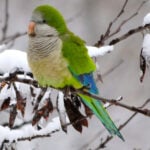 The Traveling BirdJune 26, 2025Can You Name 5 Parrot Species That Are Living Wild in the USA?
The Traveling BirdJune 26, 2025Can You Name 5 Parrot Species That Are Living Wild in the USA?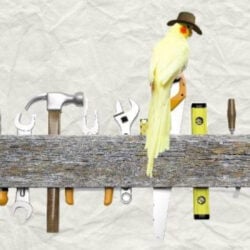 Bird BehaviorJune 26, 2025How is it Parrots Are Problem Solvers Social Animals and Even Use Tools?
Bird BehaviorJune 26, 2025How is it Parrots Are Problem Solvers Social Animals and Even Use Tools?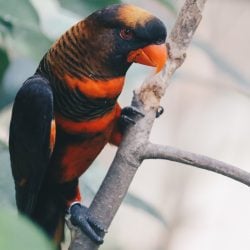 Bird & Parrot AnatomyJune 25, 2025How a Tiny Chemical Modification Makes Parrots Nature’s Living Paintings
Bird & Parrot AnatomyJune 25, 2025How a Tiny Chemical Modification Makes Parrots Nature’s Living Paintings
